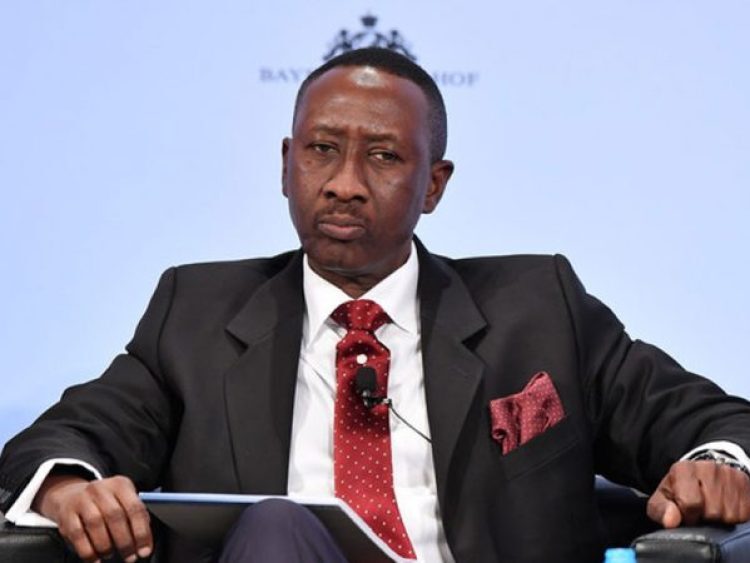President Muhammadu Buhari has remained a sad man as a result of the persistent insecurity in the country which the nation’s security agencies have been unable to end, Maj. Gen. Babagana Monguno (rtd.) has said.
Briefing correspondents after a three and half hours long meeting of the National Security Council presided over by the President at the Presidential Villa, Abuja on Thursday, he said Buhari cannot be happy when people are being killed on a daily basis.
According to him, the last straw was the recent attack on the Abuja-Kaduna train leading to the deaths of some passengers and scores kidnapped.
He said Buhari has consequently ordered the rescue of all kidnapped persons unhurt using the train attack as a fulcrum.
The NSA noted that the President feels that enough was not being done by the security agencies despite what has been provided.
He said: “Mr President commenced the meeting, in his opening remarks, he spoke about his sadness in respect of the recent developments in the country, the recent security challenges we’ve had, in particular, the incident in which several Nigerians lost their lives and many more have been taken into captivity by criminals and bandits.
“Mr President has directed all the operational and intelligence elements to rescue these innocent people immediately and unhurt. This is the basis, on which other issues were discussed. Obviously, the Chief of Defense Staff and the service chiefs, as well as the Inspector-General of Police, all briefed the President on the occurrences in their respective organizations.”
Speaking further, he said: “Well, someone also said that I’m always saying the President is not happy. How can the President be happy in a situation where people are dying? He can never be happy.
“If 10 times something happens, 10 times he will be unhappy and as the leader of this country, the father of the nation, he has to express his displeasure.
“You know, he is just at the managerial level, he gives us instructions. And his displeasure is probably because he feels enough is not being done.
“So, we can’t put this thing on his shoulders completely. He’s at the strategic level, he takes the decisions. But when these things become endless, he has to express concern. And that’s just what he did.”
He added: “A lot of lives are being lost. The President is not happy about this situation. He (President) has made it very clear. The first assignment he’s given to the security agencies, especially the armed forces and the police is to rescue those that are in captivity, not just those that were captured during the last train incident, but those that have been in captivity in other parts of the country. That is the first thing that has to be done.”
Monguno stated that the President alone cannot completely receive the blame for the insecurity in the country as his part is to make strategic decisions which the NSA said he has been doing.
He added that the surrendering of Boko Haram elements has not engendered the desired result in the stemming of insurgency in the country.
Monguno remarked: “Now, the issue in the Northeast, there’s been a lot of improvement and that has been attested to by the governor of Borno State during our last National Council of State meeting.
“But nevertheless, the fact that the Northeast is becoming much more stable, more and more people from the terrorists have started surrendering to government, has not really brought to an end the way we would want the situation in the country because the threat is now shifted from the Northeast to the Northwest and to the Northcentral, and this threat has to be contained.
“It has to be contained collectively by both the armed forces as well as the constabulary forces; the Nigerian Police Force, Civil Defense, but the intelligence agencies also have been directed to enhance the acquisition of intelligence.”
The NSA also spoke on the threats coming from the country’s vast land borders and the need to replicate in them what has been achieved in the maritime borders.
“Obviously, we have very extensive borders, and I’m not going to deceive anyone. All of us know that we have problems of infiltration by virtue of the fact that we have a very large economy. It attracts a lot of people from outside and they come in illegally, not just through the land borders, but also through the maritime waters.
“Of course, in the case of the maritime borders, most of the things have been done in the last one year, to secure the maritime to up to the point that the International Maritime Bureau has acknowledged the fact that in 27 years, our maritime borders have not been as secure and peaceful as they were in the last one year.
“That is a fact, it is not a conjecture, I didn’t cook up this thing. So, we want to see how we can replicate that type of effort to put in the maritime domain on our land borders. That is something that the council is looking into.”
Speaking on the memo he presented to the council, which he said is now being considered by the President, he noted: “My recommendations are wide-ranging and they touch on all aspects of security, starting with the level of security of our land borders, as well as within the country itself.
“In terms of securing the nation, we’ve recorded a lot of successes in the maritime domain and obviously, the problem now has shifted to our borders from outside. As a result of that, there’s a need for us to configure how we’re going to make our borders more secure because of the threats coming from outside the borders.”
He also stressed the imperative of intelligence from ordinary citizens as he noted that unless the wider society is willing to provide the necessary intelligence, the problem of insecurity will linger beyond the time frame intended to end the menace.
According to him, the present situation in the country calls for a collective effort by all, not just those that have been charged with the responsibility of physically securing the country as he stressed that the most important thing, for now, is the acquisition of intelligence, particularly human intelligence.
The NSA explained: “I need to make it very clear, I have to be very honest; unless the wider society, right down to the local governments, are willing to give the type of information that is needed to block the activities of these criminals, this situation will continue to linger beyond whatever timeframe we’re looking at, towards ending this great problem.”
Responding to a question, Monguno lamented the high cost of technology, which has made the country unable to acquire adequate security devices to fish out criminals.
He stated: “So, the first question has to do with why is it so difficult to deploy the technology. One, technology is expensive. Technology takes time to acquire these things. Since inherently we do not produce this very delicate equipment.
“It’s not as if the government is not making any effort to acquire but we need to know who to acquire this technology from, where, when and there are certain processes.
“For now, I know we have but the plight is that they are inadequate. So, to the government, it’s a continuous process. That’s what I can say about the issue of deploying technology.”
In his remarks, the Inspector General of Police, Usman Alkali, affirmed that the force is working towards changing the narrative on security to enable peaceful conduct of all the elections ahead.
IN CASE YOU MISSED THESE FROM NIGERIAN TRIBUNE
- ‘Officials initially offered to help but when the number of able-bodied citizens at the centre increased, they left us unattended to’
- Why Ogun Tops List Of ‘Yahoo Boys’ In Nigeria ― Governor Abiodun
- Police, Amotekun after criminals on Lagos-Ibadan expressway
- Suspected cannibal pays N500,000 for boy’s human organs, says ‘that’s my favourite meal, especially the throat’
- Court awards Nnamdi Kanu N1 billion over invasion of his home by military, asks FG to apologise






